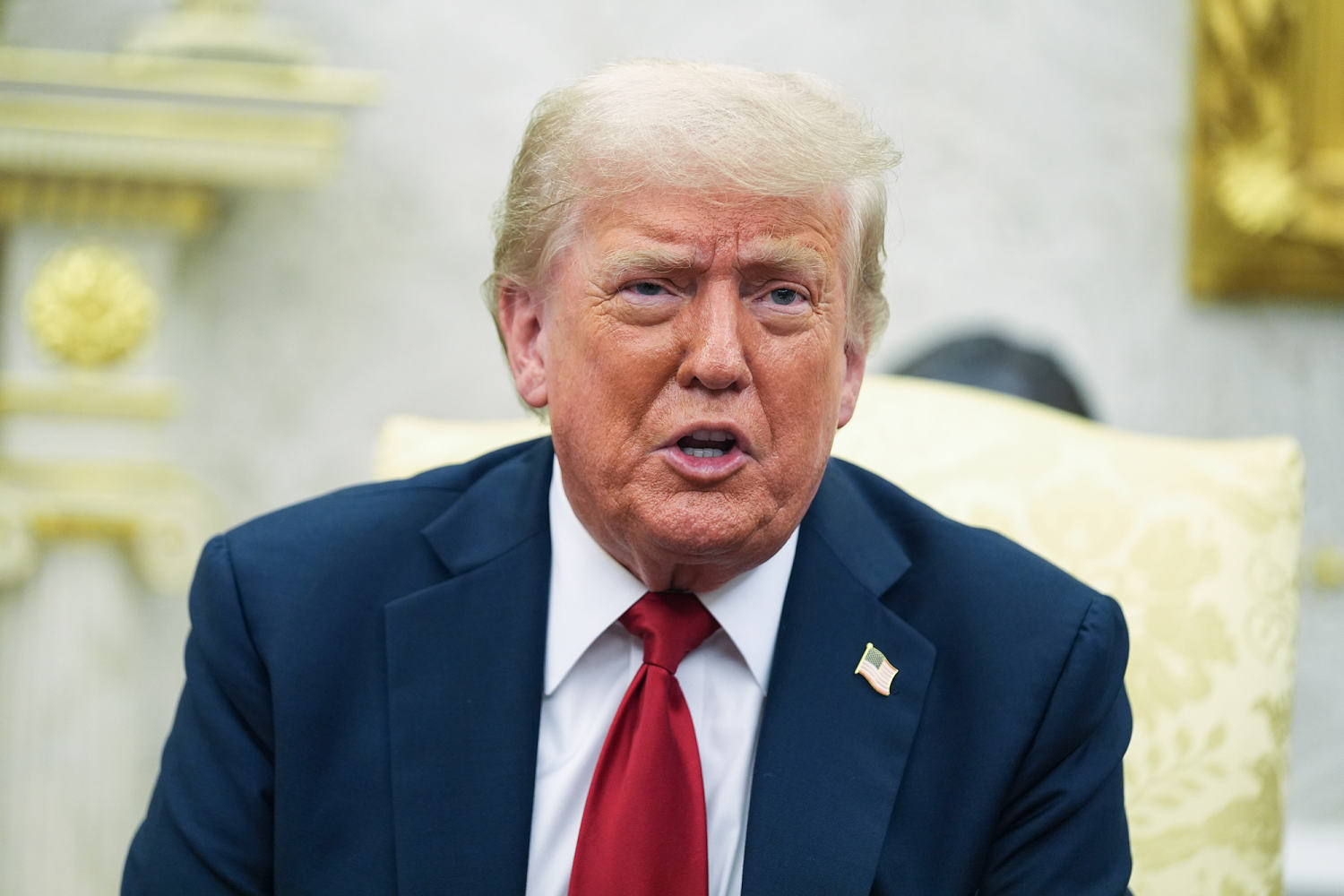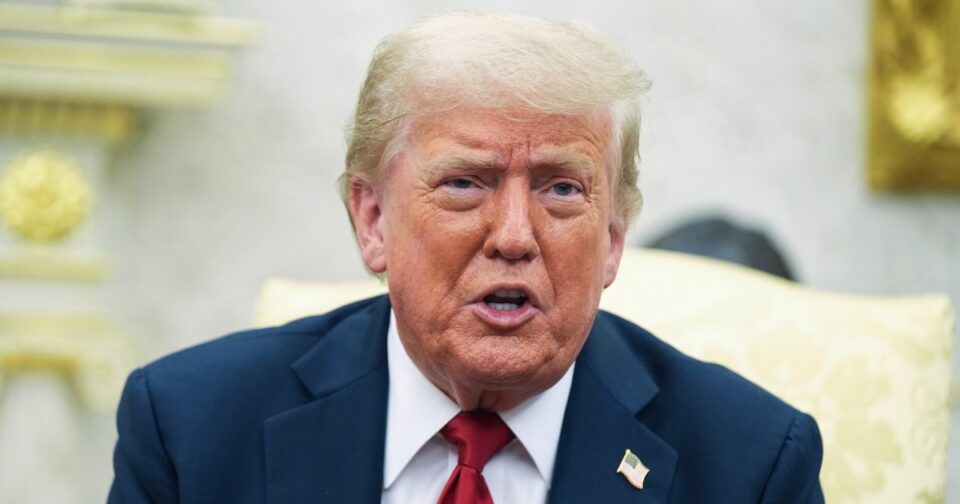
To mark the first six months of President Donald Trump’s second term in office, the White House shared a social media post promising three things will continue as his term proceeds: the “winning,” the deportations and the memes. “ATTENTION: TRUMP DIDN’T COME TO PLAY,” reads the caption of the post, which was uploaded to Instagram and X on Sunday. It’s coupled with an illustration of Trump in front of an American flag, a bald eagle, fireworks and dollar bills. The post is a window into how the White House has approached its overall social media strategy during Trump’s second term. Previously, official White House social media accounts were used largely to promote presidents’ policies.Since January, however, the Trump administration has shifted its tone on social media to cater to its MAGA base. Many posts — several of which play off of trending memes — appear to showcase aggression toward some longtime political targets for Trump, such as immigrants and Democrats. The memes have included: a cartoon depiction of a person who appears to be a migrant crying while being arrested, a fake dating app profile matching a “recently arrested” woman with ICE and a Valentine’s Day card that read: “Roses are red, violets are blue. Come here illegally and we’ll deport you.” Such posts have generated some shock online, which the White House itself appears to have referred to this month. In a post on X, the official account wrote: “Nowhere in the Constitution does it say we can’t post banger memes.” The image in the post is of a sign on the White House lawn that reads, “oMg, diD tHe wHiTE hOuSE reALLy PosT tHis?”The official White House social media accounts, and those for government agencies, are different from Trump’s or other officials’ personal accounts. The official accounts are passed along to each new administration for their officials to use, and since the Obama administration, each account’s content has been archived by the National Archives, in compliance with the Presidential Records Act.But several official White House posts highlight or pull language from Trump’s personal account on his platform, Truth Social, where he frequently blasts his political opponents or shares images that appear to have been made with artificial intelligence tools. White House accounts have also shared AI-generated images of Trump as the pope, a “Star Wars” character and Superman. Joshua Tucker, a co-director of New York University’s Center for Social Media and Politics, said such posts are designed to “get people’s attention.” Social media has drastically changed since Trump’s first term — when users would mainly see posts from accounts they followed. Now, many social media platforms use an individualized algorithm for each account that Tucker said “privileges things that pop and that go viral.”“We’re not quite in the world where it’s just like, ‘If I just tweet, all my followers are going to see what I tweet,’” Tucker said. “It’s ‘I need to come up with something that’s going to be catchy.’”Among the potential cons of the strategy, Tucker said, is the White House’s “pushing back against norms of what is proprietary in terms of official statements.”Asked about the administration’s use of social media during Trump’s second term, White House spokesperson Liz Huston said, “Every day, the White House digital accounts highlight President Trump’s widely popular America First agenda and the tangible quality-of-life improvements he has delivered for Americans nationwide.”Other official government accounts for various agencies have taken on similar tones. The Department of Homeland Security’s official account has promoted self-deportation through the CBP One app by posting a video set to the song “Take Me Home, Country Roads.” The song “Ice, Ice Baby” is the soundtrack for another video pointing viewers to the Immigration and Customs Enforcement tip line.In June, DHS also posted what appeared to be an AI-made image of alligators with caps that read “ICE” on them, writing in the post, “Coming soon!” It came amid the opening of a controversial immigrant detention center in Florida, which state Republicans have informally dubbed “Alligator Alcatraz.”Asked whether she is concerned about the content’s being divisive or making light of issues the administration wants people to take seriously, DHS spokesperson Tricia McLaughlin said: “Not at all.”McLaughlin said she sees the role of the DHS social media accounts as giving people “the truth” and circumventing media outlets she deems hostile. “Eight years ago, under the first Trump administration, we didn’t have the social media environment that we have today, and so I think that we were more beholden to what the media was saying, and we couldn’t necessarily straighten out the facts,” McLaughlin said. “And now, you know, we have a presence that we’re able to do that.”Parker Butler, who ran the @KamalaHQ accounts as the director of digital rapid response for the Biden-turned-Harris 2024 presidential campaign, described what the White House is doing online as “trolling for the sake of trolling.”“They are just basically throwing toxic sludge out there and trying to gin up people’s reactions,” Butler said. “And they call that a digital strategy.”They are just basically throwing toxic sludge out there and trying to gin up people’s reactions.Parker Butler, who ran the @KamalaHQ accounts for the Biden-turned-Harris 2024 presidential campaignIt’s a perspective that has been echoed by others who follow politics and have also noticed the shift. “Like a runaway train, the Republican Party is barreling toward a future in which posting is politics — or, the purest function of politics,” writer Nathan Taylor Pemberton argued in a recent op-ed for The New York Times titled “Trolling Democracy.” “It’s a grim, ugly and barren place.” But the White House points to growth on multiple digital platforms as evidence its strategy is effective. A White House official said the administration’s official social media accounts, including on Truth Social, have added over 16 million new followers across platforms since Inauguration Day. The administration also has engaged social media stars to try to generate a broader audience. In May, Trump gave comedian Theo Von — one of YouTube’s most popular creators, particularly among young male conservatives — the role of warmup act at Al Udeid Air Base in Qatar, where Trump addressed U.S. service members. The White House’s Instagram and X accounts have also taken a page out of the typical influencer’s engagement playbook, with press secretary Karoline Leavitt uploading a weekly video segment called “MAGA Minute.” The videos post recaps — in 60 seconds — of things the president and the administration did that week that the White House wants to highlight. In May, Leavitt also held several separate “influencer briefings.” Of the 25 influencers identified by Jattvibe News who attended the initial three briefings, all but one had histories of explicit support for Trump’s administration, and some had direct connections to Trump.“We will ALWAYS find ways to meet people where they are,” Kaelan Dorr, the White House deputy communications director, said in a statement at the time.


